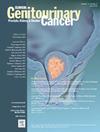一项法国多中心现实生活研究:在晚期尿路上皮癌二线治疗中,与免疫检查点抑制剂(ICIs)反应相关的生物学和临床参数:ICIs开始时抗生素给药的影响。
IF 2.7
3区 医学
Q3 ONCOLOGY
引用次数: 0
摘要
背景:在一线化疗失败后,晚期尿路上皮癌(aUC)的标准治疗是靶向PD-1/PD-L1途径的免疫检查点抑制剂(ICIs)。一些预后模型(Bajorin和bellmont评分)已被评估,但仅在化疗的背景下。目的:研究这些评分中的变量以及新出现的临床和生物学标准是否对ii线及以上ICIs治疗aUC的客观缓解概率有影响。材料和方法:在2016年10月至2023年3月期间,我们纳入了2个法国中心的168例二线或二线以上接受ICIs治疗的患者。在文献回顾和回顾性收集后选择感兴趣的变量。分析采用log-rank检验和多变量模型(二元逻辑和Cox回归)。结果和局限性:诊断时的中位年龄为68岁。膀胱肿瘤占73.8%,上尿路肿瘤占26.2%。63.7%的患者仅接受过一次化疗。开始使用ICIs后的中位随访时间为8.9个月。与客观反应相关的统计变量为:与内脏受累相比,存在局部晚期或仅淋巴结疾病(调整优势比为0.19,95%可信区间[0.06-0.55],P = 0.002)和仅骨骼受累(aOR为0.22 [0.08-0.64],P = 0.005)——在ICIs开始前/后一个月没有抗生素治疗(aOR为0.31 [0.12-0.84],P = 0.021)。局限性包括回顾性设计和纳入的患者数量较少。结论:这项来自法国2个中心的现实研究发现,与内脏或骨骼疾病相比,在ICIs开始时没有抗生素治疗的情况下,在局部晚期或淋巴结疾病中,客观反应的可能性更高。我们的研究结果表明,抗生素治疗对ICIs反应的负面影响需要进一步研究,以优化这些患者的管理。本文章由计算机程序翻译,如有差异,请以英文原文为准。
A French Multicenter Real-Life Study on the Biological and Clinical Parameters Associated With Response to Immune Checkpoint Inhibitors (ICIs) in Second-Line Treatment of Advanced Urothelial Carcinoma: Impact of Antibiotics Administration at the Time of ICIs Initiation
Background
After failure of first-line chemotherapy, standard of care for advanced urothelial cancer (aUC) is immune checkpoint inhibitors (ICIs) targeting PD-1/PD-L1 pathway. Several prognostic models (Bajorin and Bellmunt scores) have been evaluated, but only in the context of chemotherapy.
Objective
To study whether the variables in these scores and new emerging clinical and biological criteria have an impact on the probability of objective response in aUC treated with ICIs in 2nd-line setting and beyond.
Materials and methods
Between October 2016 and March 2023, we included 168 patients treated with ICIs in 2nd-line setting or more in 2 French centers. Variables of interest were selected after a literature review and collected retrospectively. Analyses used log-rank test and multivariate models (binary logistic and Cox regressions).
Results and limitations
Median age at diagnosis was 68 years. Patients presented with bladder tumors in 73.8% and upper urinary tract tumors in 26.2%. 63.7% of patients had received only one line of chemotherapy before ICIs. Median follow-up after starting ICIs was 8.9 months.
The variables statistically associated with objective response were:
− The presence of locally advanced or lymph node-only disease compared with visceral involvement (adjusted Odds Ratio 0.19, 95% confidence interval [0.06-0.55], P = .002) and bone-only involvement (aOR 0.22 [0.08-0.64], P = .005)
− The absence of antibiotic therapy the month before/after ICIs initiation (aOR 0.31 [0.12-0.84], P = .021).
Limitations included retrospective design and small number of patients included.
Conclusion
This real-life study from 2 French centers found a higher likelihood of objective response:
− In the absence of antibiotic therapy at ICIs initiation:
− In locally advanced or lymph node-only disease, in contrast to visceral or bone-only disease.
Our results suggest that negative impact of antibiotic therapy on the response to ICIs needs to be further investigated to optimize the management of these patients.
求助全文
通过发布文献求助,成功后即可免费获取论文全文。
去求助
来源期刊

Clinical genitourinary cancer
医学-泌尿学与肾脏学
CiteScore
5.20
自引率
6.20%
发文量
201
审稿时长
54 days
期刊介绍:
Clinical Genitourinary Cancer is a peer-reviewed journal that publishes original articles describing various aspects of clinical and translational research in genitourinary cancers. Clinical Genitourinary Cancer is devoted to articles on detection, diagnosis, prevention, and treatment of genitourinary cancers. The main emphasis is on recent scientific developments in all areas related to genitourinary malignancies. Specific areas of interest include clinical research and mechanistic approaches; drug sensitivity and resistance; gene and antisense therapy; pathology, markers, and prognostic indicators; chemoprevention strategies; multimodality therapy; and integration of various approaches.
 求助内容:
求助内容: 应助结果提醒方式:
应助结果提醒方式:


